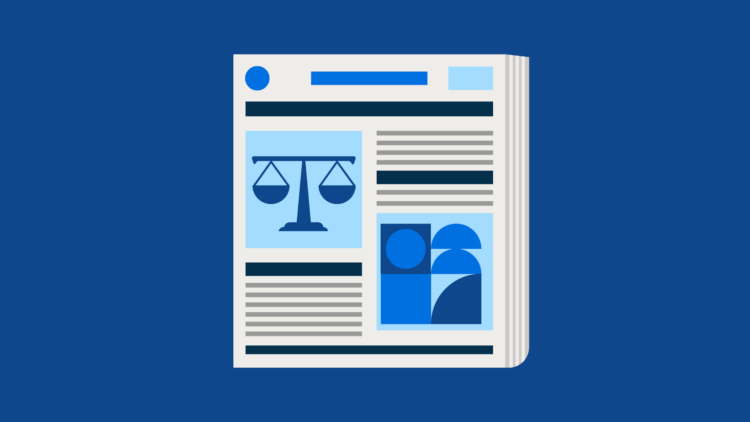For the second year in a row, we surveyed a number of great minds in the legal community for their opinions on legal tech. From bitcoin and blockchain to A.I. and chatbots, there’s plenty to get excited about.
Respondents to this year’s survey included:
- Mike Whelan, lawyer, podcaster, and author of Lawyer Forward: Finding Your Place in the Future of Law.
- Mike Semanchik, Managing Attorney, California Innocence Project
- Sarah Glassmeyer, Project Manager Specialist at the ABA Center for Innovation and former Research Fellow at the Harvard Library Innovation Lab
- Carolyn Elefant, Founder and Owner of Law Offices of Carolyn Elefant, editor of MyShingle.com, and author of Solo by Choice: How to Be the Lawyer You Always Wanted to Be
- Keith Lee, attorney at Hamer Law Group and editor of Associate’s Mind
- Jordan Couch, Attorney and Culture Ambassador at Palace Law
- Jason Morris, Founder and Partner at Round Table Law
- Chelsea Lambert, Editor of the Lex Tech Review
- Sara Kubik, Ph.D., recent law school graduate with a doctorate in Technology and an MBA in Marketing
We asked them about:
- The biggest legal tech news of 2017
- The biggest surprises in legal tech this year
- The most over-hyped legal tech trends of 2017
- Favorite apps of 2017
- Apps to get excited about in 2018
- The most important legal tech trends to watch in 2018
- The biggest risks and opportunities for lawyers next year
Here’s what they had to say:
Biggest legal tech news of 2017
There were several contenders for the biggest legal tech news story of 2017, with A.I. taking a top spot yet again.
A.I.
“The barista at my local Starbucks who thought about going to law school one time was getting ready to launch a legal tech company that focused on A.I. indigent defense via crowdsourcing along the blockchain,” said Keith Lee. “That’s how prevalent it’s been.”
However, he added that while A.I. monopolized the beginning of 2017, its dominance slowly faded as the year went on. “A.I. is a new, useful tool that continues to develop,” Keith said. “The legal industry will continue to adopt and apply it as the technology evolves.”
Tyler Technologies acquires Modria
This June, Tyler Technologies, which provides end-to-end information management solutions and services for local governments, acquired Modria, a company specializing in online dispute resolution (ODR).
Both Sarah Glassmeyer and Mike Whelan pointed to this as the biggest piece of legal news for the year. Why? As Sarah explained:
Tyler Technologies is a leading provider of software and tech to courts. If Tyler can get courts to use and adopt ODR, think of how that could impact the access to justice gap!
The $1 Million Clio Developer Fund
Both Jordan Couch and Chelsea Lambert pointed to the $1 Million Clio Developer Fund, launched at the 2017 Clio Cloud Conference, as the year’s biggest news. As Jordan put it:
There is a lot of amazing legal tech out there, and a lot of incredible people innovating within the legal industry, but most of that exists on the fringes and in small communities of people. Clio’s developer fund does two things that have never been done on that scale before. First, it shines a spotlight on all of the amazing things happening in the legal profession and fosters their growth. Second, it encourages collaboration among innovators by declaring (and investing in) the belief that even the big tech companies are strengthened by increased collaboration among innovators.
Biggest legal tech surprises of 2017
Jason Morris pegged DocAssemble, an open-source system for guided interviews and document assembly, as the biggest surprise in legal tech for the year. For Chelsea Lambert, it was Evolve Law joining forces with Above the Law.
Sarah Glassmeyer was pleasantly surprised to see LexPredict open-source ContraxSuite, its contract analytics and legal document platform.
“It’s been my dream that Open Source technology would get a foothold in the legal tech space, but I never thought anyone would actually do it,” she said. “Kudos to Dan Katz, Michael Bommarito and the rest of the LexPredict team for leading the way.”
For Jordan Couch, the launch of Avvo’s on-demand legal services last year was still the biggest surprise.
This was clearly a very thought-out and deliberate attempt to push the boundaries of the legal profession in ways that modern consumers have been begging for for years. Even with vast consumer support this was an incredibly bold move (as evidenced by the reactions of bar associations across the country) but it has paid off and it will have a lasting beneficial impact on the lives of a lot of legal consumers.
Finally, Sara Kubik was most surprised by how much of an impact legal tech could have, especially following her efforts with @HelpTheLawyers supporting access to justice efforts by lawyers’ working pro bono on immigration cases in the U.S. earlier this year.
“I think too many people believe legal tech is only content management systems, or hyped-up trends,” she said. “If you think of legal tech more loosely, you will not be frustrated with the narrowness, and can look to other forms of technology to satisfy your goals.”
You may like these posts
Most over-hyped trends of 2017
The majority of respondents said that chatbots were at least one of the most over-hyped trends for 2017. Carolyn Elefant explained it well: “Don’t get me wrong—some of them are really cool—but the quality is mixed, and many are not necessarily ready for prime time,” she said.
There were two other picks for over-hyped trends: blockchain and, interestingly, A.I.
Blockchain
Keith Lee reiterated his thoughts on the most over-hyped trend from last year’s survey (which we admit we did not include in last year’s law firm technology trends round-up—sorry Keith). He predicted that blockchain would be all the rage but that it would have “ZERO impact on the legal industry in 2017.” He added:
Obviously bitcoin is all the rage, but the underlying blockchain technology didn’t make many waves in the legal industry in 2017 … 2018 will likely be the year it really gains some ground, but it won’t be going mainstream yet.
A.I.
As Chelsea Lambert pointed out, A.I. is nothing new. “A.I. and machine learning tools have been used for years,” she said. “For example, when your smartphone tells you to leave early because there’s traffic… that’s an example of A.I. or machine learning to improve user experience.”
However, she does believe that A.I. has useful applications in the legal industry. Sarah Glassmeyer agreed.
“Everyone’s going to say A.I. [was overhyped], but that’s because very few people actually understand what A.I. is and what it is capable of,” Sarah said. “I think the Casetext CARA tool showed that A.I. and law has a real possibility.”
Favorite tech from 2017
Plenty of new apps and services (legal specific and otherwise) that came out this year. There are also plenty of existing ones that those we surveyed said they’ve started using recently and now love. Here’s a sample:
- Habitica. “Why not have a little fun while changing your habits? Our minds and our bodies are the instruments we use to help others, and we can develop better habits to improve them,” said Mike Whelan.
- Xero. “The Clio integration makes life super easy for a small firm with not a bunch of time for the business side of things,” said Mike Semanchik, who founded Semanchik Law Group with his wife after this year’s Clio Cloud Conference.
- MetaJure. “In short, Metajure gave me easy access to the institutional knowledge of my firm,” said Jordan Couch. “Before if I wanted to learn about a particular opposing counsel or expert witness, I would have to ask around and hope that someone had kept records. Now every file and email our firm has is OCR’d and available for plain language searches. In ten seconds I can find every case of ours that a specific expert witness has ever been involved in and pull up all available records.”
- Google Chromebook. “[Having a Chromebook] enabled me to work from Europe. At just $150, I had no worries about losing it, plus there’s no client data at risk since it’s all in the cloud,” said Carolyn Elefant.
Meanwhile, Jason Morris is considering a number of changes to his tech stack in 2018. “We are doing some R&D on DocAssemble, Neota Logic, Oracle Policy Automation, and Ergo Suite for expert system development, which looks promising,” he said. “We’ve also moved our hosting to DigitalOcean, which has vastly improved the reliability and responsiveness of our website.”
Tools that our legal tech experts said they couldn’t live without included Clio, Xero, Slack, Twitter, and Trello. “I have to tell people I work with that if a task doesn’t get put on my Trello board with a due date it will probably never happen,” said Jordan.
Finally, Mike Semanchik added that e-signatures are critical for what he does. “Allowing clients to electronically sign documents through Adobe is something we could not live without,” he said.
Tech to get excited about in 2018
With the start of Clio’s Launch//Code contest and Developer fund this year, there will likely be no shortage of new apps to get excited about in 2018. For now, here’s a sample of apps to watch from our legal tech experts.
Tali
More than one person is excited to see what Tali does in 2018. Jordan Couch explained:
I have been one of Tali’s biggest fans since I first heard about it earlier this year. Tali is a voice time tracking program that runs through Amazon’s Alexa. All of my work in on a contingency basis so I don’t use Tali, but I recommend it to everyone. The greatest inventions are those that solve a small, common problem in a an elegant and simple way. Tali exemplifies that concept and it has a great team of people behind it.
Similarly, Mike Whelan stated:
Tali is my favorite new friend. We decked out the house with five Amazon Dots and were stuck asking Alexa for music and recipes. Tali allows me to actually make money off of these tools. [Tali’s] story is one of asking a question, developing an answer, and solving a problem. Give Tali a try.
The Fastcase A.I. Sandbox
As Sarah Glassmeyer explained, the FastCase A.I. sandbox is a great way for firms to explore A.I. “Law may never have Big Data, but we have Enough Data,” she explained. “Law firms are sitting on a pile of useful information that they could be taking advantage of. This A.I. Sandbox is a great way to dip your toes in the water.”
New legal research tools
Carolyn Elefant stated, “[I’m excited about] new legal research products like CaseText’s CARA that take a new approach to legal research—I can’t wait to have it scrape the cases from a brief so I can have them all at my fingertips at oral argument.”
Lawyaw’s Document Automation Platform
Chelsea Lambert said, “Lawyaw offers the most advanced cloud based automation tools to date. While only available in California, I hope to see this technology become available to other states as well.”
Finally, Keith Lee stated that “anything that helps people carve out large blocks of their time to be free from distractions,” is worth a look, but cautioned that “real growth and change is often about removing things from your life, not adding stuff to it.”
Technology is becoming increasingly critical for law firms, but every firm is different, and it’s important that each one takes on the tech that truly meets their needs.
Most important legal tech trends for 2018
Those monitoring legal tech trends will have their work cut out for them in 2018—there’s a lot going on, with potential for some technologies to have a big impact. Here’s what our experts are watching:
- Big Data. “The data nerds are looking feverishly for people who know how to ask the right questions so they can develop the answers,” said Mike Whelan. “Collaborate with these experts. Read the book The Fuzzie and the Techie on this. Or Everybody Lies. Just read something, and start asking the hard questions.”
- Security. “Law firms have an amazing amount of data and information that hackers want,” said Sarah Glassmeyer. “I bet we’ll see more law firm hacks and exposure of sensitive client information in 2018.”
- Consolidation. “The past few years have seen a number of legal tech companies gain some traction,” said Keith Lee, “but it’s impossible for them all to survive and thrive. Expect the bigger players in the space to accelerate acquisitions of promising companies.”
- Invention. “Where innovation is about tinkering with an existing product to make it better, invention is about creating a whole new product,” explained Jordan Couch. “There is only so much tinkering that can be done with any product before progress begins to level off and you have to create something totally new. The legal industry is starting to reach that plateau of innovation and it’s time start watching for the invention that will replace modern law firms. There are a few people around the country who are already working on doing just that and the products they are putting together are incredible.”
- APIs. “If you can’t connect [a platform] to all the other tools you use, it is creating more work that it needs to,” said Jason Morris. “Also, the rate of release of things like Zapier extensions seems to be accelerating. We haven’t reached peak interoperability yet.”
- Text. “Consumer communication has shifted from phone and email to text messaging. In order to improve new client conversion rates and increase overall client engagement, the use of text messaging in daily or routine communications will become a requirement,” said Chelsea Lambert.
Biggest opportunities and risks for lawyers in 2018
Finally, our legal tech experts shared what they see as the biggest risks and opportunities for legal professionals to keep in mind going into 2018:
Risks
- Rollbacks of reforms. “The biggest threat for me personally is the potential for the government to roll back criminal justice reforms that have helped to reduce wrongful convictions over the last few years,” said Mike Semanchik.
- Lack of demand for legal services. As Keith has pointed out on Twitter here and here, demand for legal services isn’t growing. “Combine that with the trend I said was a threat last year (non-lawyer legal services) and that means there are more people competing for a pie that isn’t growing,” he said. “Below average lawyers are going to be squeezed out.”
- Changing market dynamics. “As clients demand the same services for less money, lawyers will have to find new ways to increase volume if they are to maintain the same workload and profits,” said Jordan.
- Failure to learn about technology. “Lawyers are always learning and they should always be learning about technology,” said Sara Kubik. For those who want to learn more about tech, she suggests keeping it simple—looking at the tech you’re already using on a daily basis, and at what your clients are using, is a good start.
Opportunities
- Using tech for better work-life balance. “The biggest opportunity is using software to be more efficient and maximize working time so you also have family time,” said Mike Semanchik.
- Using tech to connect with clients. “Technology that allows you to make connections with current or prospective clients is becoming more and more accessible every day,” said Sarah Glassmeyer. “By this I mean chatbots, blogging, and client portals, to name a few options. The only threat from technology is not embracing it and continuing to do things the way you’ve always done them.”
- The internet. Reiterating his prediction from last year, Keith Lee stated that the internet remains the biggest opportunity for solos and small firms. “Uber didn’t exist five years ago. Now it’s a multi-billion dollar company and has supplanted the word ‘taxi’ from the everyday lexicon,” he explained. “The internet is still the Wild West. Attorneys need to embrace it.”
- Practice areas involving healthcare. “Even with the ACA in flux, there is all types of stuff going on in this sector, especially as the Boomers age out of the workforce,” said Keith.
- Practice areas involving cybersecurity. “It’s eventually going to touch everything,” Keith added. “Expect there to be plenty of work in this area for the foreseeable future.”
- Finding ways to scale. “There is a lot of money to be made, and work-life fit to be achieved, if you can find a way to make your practice scaleable,” said Jordan Couch. “The typical law firm sells hours of attorney time (even those that use alternative fee structures). In a business like that, efficiency and higher volume does not [usually] equal increased profits. If attorneys can find a way to break the traditional model, there are a lot of gains to be had.”
- Chatbots. Chatbots appeared in our most hyped trends of 2017 section above, but Sara Kubik said that by ignoring the hype and looking at chatbots simply as a tool to help with automating daily tasks, there is lots of opportunity for solo and small law firms. “Chatbots can be used for routine things like answering client intake questions, scheduling, or taking questions about general information. Today’s chatbots do not replace lawyers. A good chatbot will assist a lawyer, especially a lawyer that does not have a lot of time to connect with prospective clients.”
In 2018, it’s clear that legal tech will continue to be important for helping law firms become more efficient and profitable. Those that adopt it and stay on top of trends early stand to benefit, while those that don’t risk being left behind.
For a successful 2018, look into some of the trends mentioned here, and keep an eye on the Clio Blog to stay up-to-date on what’s new in legal technology.
We published this blog post in December 2017. Last updated: .
Categorized in: Technology









